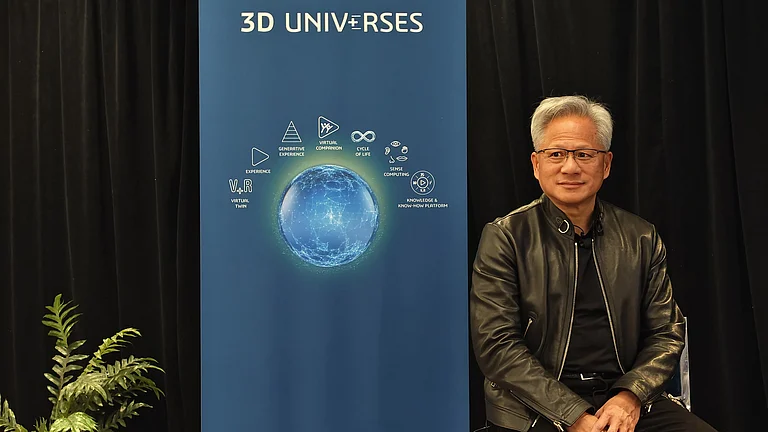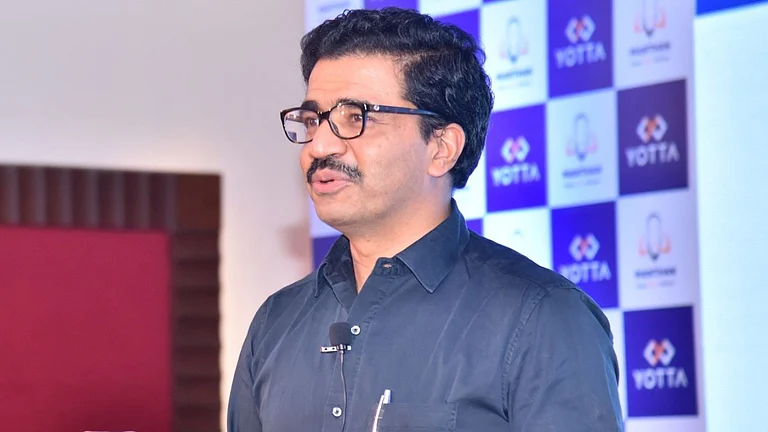A picture of Sunil Gupta sitting on a truck full of Nvidia’s artificial intelligence (AI) chips will perhaps go down in history as the moment India edged ahead in the AI race. In March this year, Gupta’s company Yotta snagged the delivery of 4,000 Nvidia AI chips—the first such consignment to India.
This was at a moment when the world was competing to get such a delivery first, hoping it would put them ahead in the AI contest. Yotta scoring the delivery meant that India’s AI start-ups and scholars could build their AI models and applications at a data centre in India and make it cost less by paying in rupees instead of dollars.
The National Cause
Yotta’s AI data centre Shakti Cloud’s scalable infrastructure has significantly reduced training time, allowing researchers to focus more on innovation and less on infrastructure hurdles, says Manu Santhanam, professor and dean for industrial consultancy and sponsored research at the Indian Institute of Technology (IIT) Madras. More importantly, this has helped ensure that the datasets being used to train AI software in India would stay within the country’s borders.
The man who has made all this possible is Gupta, co-founder, managing director and chief executive at Yotta. Gupta started up right after graduating from the National Institute of Technology (NIT) in Kurukshetra, Haryana. His first venture was an information technology (IT) company that sold personal computers, network gear and system integration services to small businesses. Gupta was responsible for sales. He says he achieved a turnover of Rs 2.5 crore within the first year.
Even though his first brush with entrepreneurship lasted only a short while, Gupta found success as a salesperson and rose up the corporate ladder with stints at Reliance Communications and NTT Data. Somewhere along the way people started calling him “the data centre man of India”.
Gupta credits the Ambanis for introducing him to data centres. It was at Reliance Communications that he first encountered the business of storing and processing data remotely. Within eight years, he launched nine data centres for the company and cornered a market share of over 60% in the country.
His second entrepreneurial journey began after spending about three decades in the corporate sector. In 2019, Gupta took the plunge to start Yotta, a data-centre company. He was backed by the real estate moghuls of Mumbai—the Hiranandanis.
Sometimes you feel humble and sometimes a bit arrogant when all of India’s AI—be it IIT Bombay, IIT Madras, Sarvam or Zoho—seems to be running on your infrastructure. Sunil Gupta, Chief Executive, Yotta
Gupta was betting on two things: one, the burgeoning of data services in India as telcos undercut each other to offer cheaper prices to consumers who could not get enough of social media and a call for data localisation by India’s policymakers. Top government officials have indicated over the past two years that foreign players may be restricted from obtaining access to certain critical Indian datasets. In 2018, the Reserve Bank of India mandated that payment service providers store all data in systems that are within the territorial jurisdiction of India.
Helping the Local Guy
In this context, Gupta is laying out the red carpet for domestic players. Players like Sarvam—a large language model start-up that uses Yotta’s AI cloud. Vivek Raghavan, co-founder of Sarvam, recently told Outlook Business: “If we need to train AI models on data that must reside in India, then we need to train on a domestic cluster of [AI chips].”
Gupta says his vision is to sachet-ise AI for India’s innovators. He has laid out a plan that will give colleges access to his AI cloud for as low as Rs 5,000 per month. “Sometimes you feel humble and sometimes a bit arrogant when all of India’s AI—be it IIT Bombay, IIT Madras, Sarvam or Zoho—seems to be running on your infrastructure,” he says.
Never mind Gupta’s nationalistic pitch, Yotta has moved to the US for listing on the Nasdaq via the special purpose acquisition company route. Asked why, Gupta says the decision had to be taken because Indian banks and investors are still warming up to the idea of funding AI chip infrastructure.
Additionally, he sees listing on the American stock exchange as an important branding exercise as about 75% of the demand comes from outside India. Gupta says nearly 60% of the costs of running an AI cloud is on account of chips. The rest is power, manpower, real estate etc—which are significantly cheaper in India. This cost arbitrage is what he is looking to exploit, he says.
When Nvidia chief executive Jensen Huang visited India in October, he said India must not miss the opportunity to become the world’s AI factory. Gupta is going all in.











